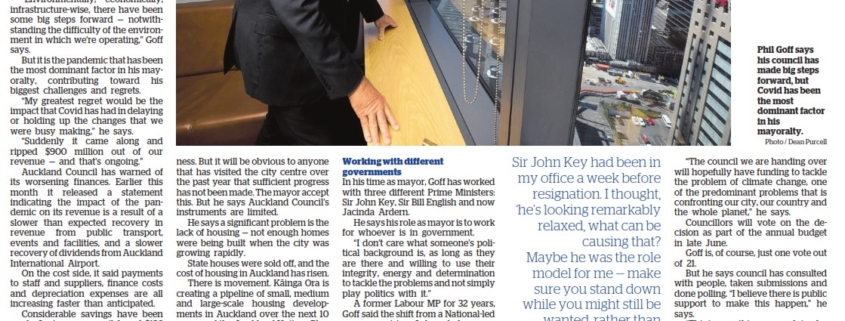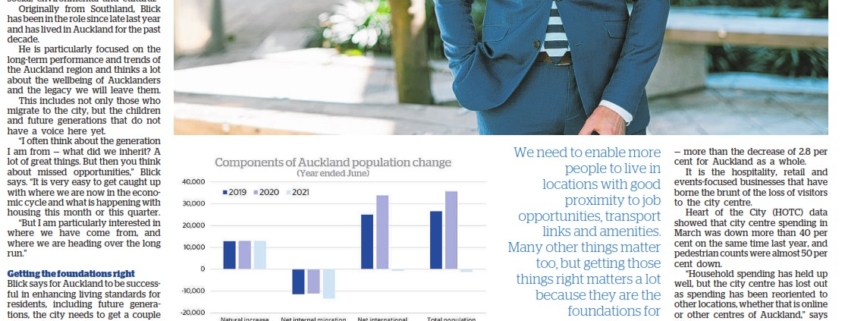Project Auckland: Phil Goff on his greatest regret as mayor of Auckland (NZ Herald)
Project Auckland: Phil Goff on his greatest regret as mayor of Auckland (NZ Herald)
After almost six years as Mayor of Auckland, Phil Goff has decided to end to his 41-year political career and will not seek re-election in October.
After two terms leading the Super City, he points to his achievements: Auckland Council has maintained its credit rating through prudent borrowing, it pays its employees a liveable wage, the Central Interceptor is on track to reduce wastewater overflows into waterways, funding is available for transport infrastructure has nearly doubled, and the Unitary Plan has unlocked future housing growth.
“Environmentally, economically, infrastructure-wise, there have been some big steps forward — notwithstanding the difficulty of the environment in which we’re operating,” Goff says.
But it is the pandemic that has been the most dominant factor in his mayoralty, contributing toward his biggest challenges and regrets.
“My greatest regret would be the impact that Covid has had in delaying or holding up the changes that we were busy making,” he says.
“Suddenly it came along and ripped $900 million out of our revenue — and that’s ongoing.”
Auckland Council has warned of its worsening finances. Earlier this month it released a statement indicating the impact of the pandemic on its revenue is a result of a slower than expected recovery in revenue from public transport, events and facilities, and a slower recovery of dividends from Auckland International Airport.
On the cost side, it said payments to staff and suppliers, finance costs and depreciation expenses are all increasing faster than anticipated.
Considerable savings have been made. Last year, the council found $126 million in cost savings and budgeted a further $90m this year and beyond.
“We have sold surplus assets, and we’re looking at what we might do with carpark buildings and various other buildings that aren’t critical to what we do,” Goff says.
“We are going to have to focus on what our priorities are.”
Further mitigations being considered include the deferral of non-critical capital expenditure projects that are not yet subject to contractual commitments, permanent operating expenditure reductions, and fully utilising the $127m in central government Better Off funding associated with its Three Waters reform to fund operating expenditure, and possible future rates increases.
“It has been bloody tough,” says Goff. “And it has meant we couldn’t fully realise the dreams and ambitions we had.”
“But having said that, when you look at similar councils like Tauranga with the same growth problems as Auckland, we have had stable governance, we have got through our business and had clear majorities for our budgets, and the council has been in safe hands.
“There are those things to celebrate — but the job has been really tough because of the environmental circumstances that we face.”
Not enough progress on homelessness
One of Goff’s cornerstone commitments before becoming mayor was to end Auckland’s chronic homelessness. But it will be obvious to anyone that has visited the city centre over the past year that sufficient progress has not been made. The mayor accepts this. But he says Auckland Council’s instruments are limited.
He says a significant problem is the lack of housing — not enough homes were being built when the city was growing rapidly.
Statehouses were sold off, and the cost of housing in Auckland has risen.
There is movement. Kāinga Ora is creating a pipeline of small, medium and large-scale housing developments in Auckland over the next 10 years and the Auckland Unitary Plan allows for 900,000 dwellings to be built within residential areas.
Goff is a big believer in Housing First, an initiative tasked with ending homelessness that he has supported since 2017.
It provides housing to the homeless, but also wrap-around support that addresses the causes of their homelessness and helps to provide stability.
Goff was instrumental in converting council building facilities during the Covid-19 lockdown to help provide meals for the homeless. “But we need to do more of all of these things,” he says. “Because we’re still we’re still a long way from tackling the problem of rising homelessness.”
Working with different governments
In his time as mayor, Goff has worked with three different Prime Ministers: Sir John Key, Sir Bill English and now Jacinda Ardern.
He says his role as mayor is to work for whoever is in government.
“I don’t care what someone’s political background is, as long as they are there and willing to use their integrity, energy and determination to tackle the problems and not simply play politics with it.”
A former Labour MP for 32 years, Goff said the shift from a National-led government to a Labour-led government had some advantages.
“I can pick up the phone and ring Jacinda, I can ring Grant Robertson, I can talk to Michael Wood,” he says.
“That’s not to say that I can ask for something and they’ll say, ‘of course Phil, we will give it to you,’ but at least I can pick the phone up and talk to them.”
When Goff campaigned in 2016 to get rid of plastic bags, he couldn’t make it work with the supermarkets and didn’t have the power to force them. But he was able to speak with the government, and they brought in enforceable legislation which he says has been a huge benefit environmentally.
“That doesn’t mean there hasn’t been areas where I’ve had strong disagreements with government — Three Waters is one of them,” he says, noting that he understands why the government wants to reform water services but doesn’t support the form that reform has taken.
“I’ve argued consistently and strongly — and although I haven’t won the battle, I have been able to talk on a personal level with an understanding and a mutual respect with ministers that I’ve known for a long period of time.”
The job’s not done yet
With six months left on the clock in his current role, Goff says he is not done yet.
In the wake of the latest Intergovernmental Panel of Climate report, he says it is clear that the time to act for the climate is now.
“We are seeing more frequent and severe weather events, we had our hottest year on record last year, and I wouldn’t be surprised if this year exceeds even that.”
Goff’s council has put money into electric buses, is converting its ferry fleet from diesel to electric, is putting money into cycling and walking, and is planting trees to provide shade and increase Auckland’s canopy cover.
But he says this is the start of the solution, and more needs to be done.
“What worse time to try to find funding to deal with the impact of climate change than when you’re dealing with Covid?
“You’ve lost revenue, and your costs have gone up,” he says. “It is easy to say Covid is the big problem at the moment, and we’ll do climate tomorrow.
“But tomorrow is when our kids grow up. If we don’t act, it’ll be harder and more expensive and economically and environmentally more disastrous.”
Goff has proposed a climate action targeted rate of $1.12 a week for a median-value residential property. This is expected to raise $574m over 10 years and unlock a further $471m through central government co-funding and other sources, ringfenced for direct climate action to cut Auckland’s emissions and respond to extreme heat.
“The council we are handing over will hopefully have funding to tackle the problem of climate change, one of the predominant problems that is confronting our city, our country and the whole planet,” he says.
Councillors will vote on the decision as part of the annual budget in late June.
Goff is, of course, just one vote out of 21.
But he says the council has consulted with people, taken submissions and done polling. “I believe there is public support to make this happen,” he says.
“This is something we are doing for the long term.
“Too often people say the trouble with parliamentarians and councillors only think in three-year terms — and too often we do. This has the chance to act with a longer timeframe in mind.”
Taking Sir John’s advice
It was just after Goff’s first month as mayor that Sir John Key resigned as Prime Minister.
Goff laughs that the way Key departed might have inspired his decision to go.
“He had been in my office a week earlier and I thought, ‘he’s looking remarkably relaxed, what can be causing that?’…
“Maybe he was the role model for me — make sure you stand down while you might still be wanted, rather than waiting to the point where you’re not!”
Reflecting on his time as mayor, Goff says he has been lucky to have had people around the council table that have worked with him on things he has wanted to achieve, and he is grateful for that.
“Because in the end, success is a collective endeavour.
“The mayor might be the person at the top of the heap, but he or she is not the only person there, and it relies on that team.”
To pass his final budget, he will need them on his side.
“It might be the last six months of my mayoralty, but it won’t be the easiest six months of it,” he says.
“I’ll be working out right up to the last moment.”



